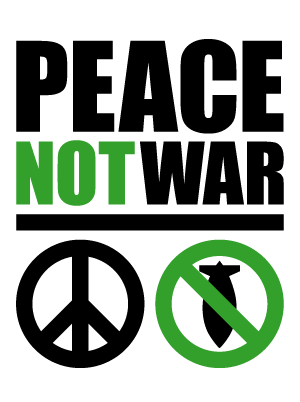A farewell to arms
by Michael Frayn
 I'm glad the Pope's against the war. Because so am I, and so is Horace Morris, and so are quite a number of other people I know.
I'm glad the Pope's against the war. Because so am I, and so is Horace Morris, and so are quite a number of other people I know.
The Pope and I don't always see eye to eye, but I'm bound to admit that on this one I think he's got hold of the right end of the stick. "No more war, war never again..." as he told the assembled delegates of the U.N. "If you wish to be brothers, let the arms fall from your hands." It touches a chord. In fact, judging by the headlines and the discussions on television, it seems to have evoked widespread acknowledgement and admiration, and no disagreement at all.
How easy, how tragically easy, would it have been for him to get it all back to front. "More war, war again and again!" as he might so easily have said. "Let's have a little more mindless mayhem—let's see the hands fall from your arms!"
All the same, I think it is only fair to point out that the Pope was not the first to declare himself in favour of peace. The previous week very similar views were expressed by Mr. Patrick McGoohan, described as Britain's highest-paid television actor, in an interview in TV Times.
Mr. McGoohan was being interviewed by Iain Sproat (who, the TV Times was careful to point out, was educated at Winchester and Oxford, so you can be pretty sure he got it down right). "We were once talking," writes Mr. Sproat "about the totally hypothetical question of what he would do were he Prime Minister. I remember he said nothing for a moment, and then: —
"I would be overwhelmed with fear, but if I were, I would try to get everyone to cease combat just for one minute. Just peace on earth for one minute! It's a fairy tale but you never know. It would feel so good that they might not start again."
Harold Wilson must be kicking himself. Not once does it seem to have occurred to him to arrange a trial run of peace on earth! That's why they pay Mr. McGoohan so much as an actor—to keep him out of politics.
Now I'm not for a moment accusing the Pope of lifting Mr. McGoohan's ideas. I don't suppose he even set eyes on a copy of last week's TV Times. By some fluke Mr. McGoohan missed the headlines—"MCGOOHAN CALLS FOR PEACE ON EARTH," "CEASE COMBAT, URGES HIGHEST-PAID TV ACTOR"—and the Pope collected all the glory for much the same idea. Like Darwin and Wallace discovering evolution. Just one of those coincidences.
"Hasn't this peace business been around before?" asked my friend Horace Morris the other day, as we sat discussing the history of ideas, in the way we often do. "Weren't there some rather scruffy people you and I knocked around with in our youth who used to walk about the roads every Easter saying roughly, in effect, let the arms fall from your hands?"
"You mean the Aldermaston marchers?"
"That's right. Very statesmanlike of them, one realises now. Tremendous sense of moral leadership they were showing."
"Good heavens, Horace, that was a different matter altogether! They were just a bunch of vague, muddle-headed idealists!"
"Not statesmanlike at all?"
"Certainly not. They weren't making a broad appeal to the hearts and minds of mankind—they were trying to get our own Government to disarm! That's politics, Horace. We'd have weakened our strategic posture against Communist intimidation."
"But haven't the Communists been coming out for peace themselves recently, in a rather broad, statesmanlike way? "
"Broadish, I suppose, Horace. But what the Communists mean by peace is peace in circumstances favourable to the spread of Communist ideas and influence."
"Whereas the Pope means peace in circumstances favourable to the spread of anti-Communist ideas and influence?"
"I should think that's what he means, Horace. He doesn't specify, of course—he's had the sense not to get bogged down in particularities and details. But I don't suppose he means 'Let the arms fall from your hands, and let the Communists peacefully take over South-East Asia.'"
"I suppose not."
"For that matter I don't suppose he means 'Let the arms fall from your hands, and let the Baluba tribesmen go on peacefully raping nuns."'
"No."
"There's peace and peace, as I'm sure the Pope would be the first to recognise."
"What he's telling us is 'Let the arms fall from your hands, but go on defending freedom against tyranny and the rule of law against lawlessness'?"
"As it were."
"By virtue as it were of the tyrants and outlaws responding to this broad supranational appeal too?"
"Exactly, as it were."
"He sees both sides of the question?"
"I think seeing both sides of the question is his strong point, Horace. For instance, you remember he said he was against birth control?"
"I was a little worried by that, I must admit."
"Ah, yes, but at the same time, Horace, he came out very strongly against people going hungry."
"I see what you mean. The broad view? The bipartisan approach?"
"Quite. In fact, he advised people to make new efforts to increase the world's food supply."
"I thought he'd got hold of a rather good idea there."
"An extremely practical one, Horace."
"I see what you mean. Really, short of doing anything it lies in his power to do, like changing his mind about birth control, he's doing everything he can."



